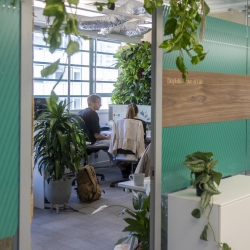To provide the best experiences, we use technologies like cookies to store and/or access device information. Consenting to these technologies will allow us to process data such as browsing behaviour or unique IDs on this site. Not consenting or withdrawing consent, may adversely affect certain features and functions.
The technical storage or access is strictly necessary for the legitimate purpose of enabling the use of a specific service explicitly requested by the subscriber or user, or for the sole purpose of carrying out the transmission of a communication over an electronic communications network.
The technical storage or access is necessary for the legitimate purpose of storing preferences that are not requested by the subscriber or user.
The technical storage or access that is used exclusively for statistical purposes.
The technical storage or access that is used exclusively for anonymous statistical purposes. Without a subpoena, voluntary compliance on the part of your Internet Service Provider, or additional records from a third party, information stored or retrieved for this purpose alone cannot usually be used to identify you.
The technical storage or access is required to create user profiles to send advertising, or to track the user on a website or across several websites for similar marketing purposes.
 We learned recently that our website is one of the many that has been used to train Google’s AI, the very thing that would supplant us. We’re not alone in that of course, but we are flattered and appalled to discover we are fairly high up the list, so obviously doing something right as far as Google is concerned. Advertisers and sponsors, please contact us in the usual way. Anyway, never mind that bollocks, here’s the new digital edition of IN, a printed magazine written, illustrated and designed by humans (and one AI). (more…)
We learned recently that our website is one of the many that has been used to train Google’s AI, the very thing that would supplant us. We’re not alone in that of course, but we are flattered and appalled to discover we are fairly high up the list, so obviously doing something right as far as Google is concerned. Advertisers and sponsors, please contact us in the usual way. Anyway, never mind that bollocks, here’s the new digital edition of IN, a printed magazine written, illustrated and designed by humans (and one AI). (more…)






















 Following last week’s announcement of the annual BCO Awards winners for London, the British Council for Offices has announced the winners of its annual Awards for the North of England. In fact all but one of the winners are located in Greater Manchester and the one that isn’t lies within twenty miles of it. The organisers suggest that the theme of sustainable office design runs through the submissions of the winning entries.
Following last week’s announcement of the annual BCO Awards winners for London, the British Council for Offices has announced the winners of its annual Awards for the North of England. In fact all but one of the winners are located in Greater Manchester and the one that isn’t lies within twenty miles of it. The organisers suggest that the theme of sustainable office design runs through the submissions of the winning entries. 









May 16, 2023
Getting back to the future of work
by Mark Eltringham • Comment, Flexible working